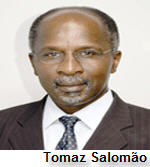After a tough Sunday in Sandton International Convention Center, Johannesburg, leaders from Southern African Development Community (SADC) member countries on early Monday morning agreed on a communique, aiming at resolving political crisis in Zimbabwe and conflict in Democratic Republic of Congo (DRC). 
Reading out the communique, Tomaz Salomao, head of the regional bloc, said that the summit decided that "the inclusive government be formed forthwith in Zimbabwe" and "the Ministry of Home Affairs be co-managed between the ZANU-PF and MDC-T."
Zimbabwean President Robert Mugabe and opposition leader Morgan Tsvangirai signed a power-sharing agreement in September, but the deal has hit the rocks over the disputes about control of the most important cabinet posts.
Both the opposition Movement for Democratic Change (MDC) and Mugabe's ZANU-PF want control of the powerful home affairs ministry.
South African President Kgalema Motlanthe, whose country holds the rotating SADC chair, had earlier said it was disappointing that it had been two months since the signing of the agreement and the parties have not yet been able to conclude the discussions on the formation of an inclusive government.
Motlanthe urged the political leadership in Zimbabwe to show political maturity and put the interest of Zimbabwe first.
However, Tsvangirai warned that the deal appeared to be slipping away.
"In practical terms, you have two ministers, one appointed by ZANU-PF, one by MDC," he said.
SADC nations are prepared to provide assistance to the DRC and send peacekeepers if needed.
The SADC decided that "the security situation in the DRC is affecting peace and stability in the SADC and the Great Lakes regions."
"The security and humanitarian situation is deteriorating in the eastern part of the Democratic Republic of Congo," the communique added.
"SADC should immediately provide assistance to the armed forces of the DRC," Salomao said.
The SADC would not stand by and witness incessant and destructive acts of violence by any armed groups against innocent people of DRC, if and when necessary, SADC will, within the Nairobi framework, send peace peacekeeping force into Kivu Province of the DRC, he added.
According to Salomao, the DRC armed forces need to be assisted to protect the country's territorial integrity and sovereignty.
The SADC Military Monitoring Commission would be dispatched to the DRC immediately to monitor the border between DRC, Burundi, Rwanda and Uganda, he said.
The region would also ask the United Nations to expand the mandate of its peacekeeping mission, known as MONUC, which is not allowed to engage in active clashes in eastern DR Congo.
Salomao denied reports that Angola had already deployed troops inside the DR Congo, but said they could be sent in quickly if needed.
The summit decided to have a SADC representative in the mediation mechanism established by the Great Lakes Region for the DRC to be based in Nairobi, Kenya, with immediate effect, he said.
According to the United Nations and humanitarian aid groups, the latest round of fighting in eastern DR Congo had displaced more than 250,000 civilians and killed at least 100 since September.
Related articles
- • UK Suspends Financial Aid to Rwanda Over M23 Rebellion (February 25, 2025)
- • UN Security Council Calls on Rwanda to Stop Supporting M23 Rebels in DR Congo (February 22, 2025)
- • Botswana Urges Joseph Kabila to Step Down (February 26, 2018)
- • Southern African Leaders to Meet in Zimbabwe (August 15, 2014)
- • New DR Congo amnesty law welcomed by UN envoys (February 5, 2014)
- • DR Congo, M23 Rebels Sign Declarations Marking End of Kampala Peace Talks (December 12, 2013)
- • DR Congo Will Defend Itself Against an Attack by Rwanda, Government Says (August 31, 2013)
- • UN Security Council debate focuses on peace efforts for Africa's Great Lakes region (July 25, 2013)
- • Warlord Bosco Ntaganda Turns Himself In at US Embassy in Rwanda (March 18, 2013)
- • Regional Leaders Sign DR Congo Peace Deal (February 24, 2013)
- • Thousands of Women March Against M23 Rebels in Kinshasa (November 24, 2012)
- • UN Security Council condemns 'any and all outside support' to M23 rebels (October 19, 2012)
- • At high-level meeting, Ban urges political solution to crisis in eastern DR Congo (September 27, 2012)
- • Tshisekedi Says He Won, Can He Prove It? (December 17, 2011)
- • Observers Hail Successful DR Congo Elections (December 1, 2011)
- • Security Council extends mandate of UN mission in DR Congo (June 28, 2011)
- • President Jacob Zuma ends working visit to the DRC (June 21, 2011)
- • Rights Groups: Strengthen Civilian Protection Before Elections (June 9, 2011)
- • UN Sanctions FDLR Leaders, CNDP Rebel Commander Integrated into Army (December 2, 2010)
- • UN launches patrols to head off rebel violence during holiday season (December 1, 2010)
- • Congo Defense Minister Rejects UN Allegations against Army (October 17, 2010)
- • Rebel leader presumed responsible for mass rape arrested (October 5, 2010)
- • UN DR Congo Report Exposes Grave Crimes (October 1, 2010)
- • UN says peacekeepers 'failed' DR Congo rape victims (September 7, 2010)
- • UN Defends Inaction on Mass Rapes in Eastern Congo, Government Missing in Action (August 26, 2010)
- • Two Suspects Arrested in Attack on MONUSCO Base (August 20, 2010)
- • Ban Ki-moon deplores deadly attack against blue helmets in North Kivu (August 18, 2010)
- • SADC Summit to Discuss Zimbabwe's Political Progress (August 16, 2010)
- • Ban Ki-moon inaugurates new phase of UN mission in DR Congo (July 1, 2010)
- • Congo Celebrates 50th Anniversary of Independence (June 30, 2010)
Tags: |







